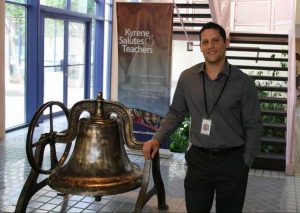
With two children attending Kyrene Public Schools (and one who graduated from them, coincidentally with some of the same teachers), parent Ted Gonzalez is all too aware of the effects of cuts to education, ranging from increased class sizes to reduced funding for music, art and physical education.
Now, however, as the Kyrene schools’ new business development and sponsorship coordinator, he’s getting not only a better understanding of the district’s budget challenges but strategizing ways to do something about them.
As part of its recent efforts to explore creative ways to generate new revenue and resources, the district has hired Gonzalez to begin building stronger relationships with businesses and other organizations within the larger community.
“I want to let organizations know how they can help support our students and schools, and how we can support them,” said Gonzalez.
In addition to encouraging businesses and organizations already involved at the school level to consider broadening their scope to the district as a whole, he intends to approach larger organizations, such as the Arizona Cardinals and the Arizona Diamondbacks, who already participate in other youth programs.
One of the main goals of the position is to develop a more specific menu of possibilities for businesses to help out in the district.
Nancy Dudenhoefer, community relations manager, explained that she’s often approached by businesses who “want to work with our school district because they’ve read our public schools need help. We want to be able to tell them how they can help.”
According to Kelly Alexander, director of community education and outreach services, “Every business has different strengths to offer.” Intel, for example provides employee volunteers and some matching funds.
“People who have a variety of expertise work with our parent-teacher organizations, teachers and children, and we also receive some financial gain from how Intel pays those hours,” said Alexander.
Other companies may offer grants, mentorships, or teaching materials. And still others simply want to advertise their product or service within the district, an option that admittedly needs more discussion before being implemented.
In 1998, state legislation opened the door to allow schools to generate more revenue through advertising on buses. While Kyrene is now likely going to join nearby districts Mesa, Scottsdale, and Paradise Valley, which have sold bus advertising, “we want to be extra sensitive to our community and their values and desires,” said Alexander. “We certainly don’t want to create a situation that makes our community uncomfortable.”
Advertising isn’t the only approach being discussed, though.
Kyrene’s large boundary “provides a large scope of possibilities for potential revenue generation,” said Kyrene board president Michelle Hirsch.
“The challenge, however, is to be creative while remaining within state statutes and public school district policy limitations.”
To help ensure new business partnerships stay within those limitations and support the district’s core education mission, the district opted to create the in-house position now occupied by Gonzalez instead of hiring an outside firm as many other districts have done.
Aside from greater control (and elimination of any potential for profit sharing), a Kyrene staff person with a friendly face and a name—Gonzalez—will more likely yield the long-term relationships vital to the district.
“Ted can help make community organizations, senior citizens, business owners and others who don’t necessarily have children in school more aware of the good things we’re doing in Kyrene,” said Hirsch.
These relationships can also help the business community better understand “how schools are funded, what committees they might be able to offer their employees to serve on and even possibly how to implement change for a more efficient operation statewide,” said Alexander.
The district also wants to make sure its programs are “respectful of any relationship that’s already in place,” said Dudenhoefer. “We want to enhance opportunities to help out the schools, which may include advertising, but also includes many other things.”
Building a position from the ground up “is going to take time to develop the process,” said Gonzalez. But he brings experience that ranges from business ownership to event and promotion planning for the annual downtown Cinco de Mayo festival, giving him a base of understanding of how to work with diverse groups with competing priorities.
“Once I start developing relationships with different organizations,” he said, “we’ll find out what works for a school district—what businesses can offer, and what we can give in return.”


